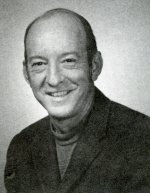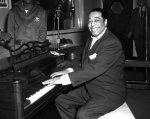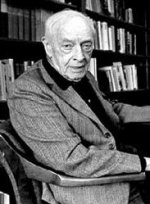
Commencement Address
An address delivered upon Williams's receipt of an honorary doctorate bestowed by Columbia College, Chicago, Illinois. June 1984.
[Content Warning: Please be aware that some of the contents of this manuscript may be disturbing or activating. Specifically, in one instance, Williams uses racist, derogatory language to describe African Americans that is reflective of a broader culture of racism.]

William Appleman Williams.
Image courtesy of the Oregon State University Daily Barometer, July 10, 1986.
I am flattered, if a bit uneasy, to be honored in the same forum as Edward Kennedy Ellington. The Duke spoke to two issues that I would like to encourage you to consider most seriously.
The first is nicely described in this commentary on Ellington's integrity. "A work could be successful, but if it made people jovial when [Ellington] thought a serious mood should have been evoked, he would change it. If it wasn't what he wanted, he wouldn't take advantage of a success that was contrary to his intentions."
The second involves Ellington's response to a good band of younger musicians. He listened to their first records, then made it a point to hear them in a live concert. Back in the hotel, over a drink, he said this: "Well, they read and play the notes well, but they hang on to their vibratos like virgins."
So the first moral for this afternoon is to hit the notes clean and then move on to the next note, always honoring one's best intentions. Do not hang there twisting in the wind of your own ego.
The second moral for this afternoon is taken from an early book written by Saul Bellow. As I would hope you know, Bellow is an unusually thoughtful and talented man who makes his home in Chicago. He is in truth a citizen of the world; a Nobel Laureate in Literature; a man who informs our lives.
Some years ago Saul Bellow wrote a novel called Seize the Day. It appeared coincidentally within a few years of an early work by Bernard Malamud called The Natural. Both novels are powerful allegories about American history, and as an aspiring historian I read them with enthusiasm and joy, but also with fear and trepidation. They at once scared me and gave me hope for my profession and for my country.
Malamud's book has been cleaned up - or, perhaps more accurately, watered down - for the movies. The terror is gone. And yet that sense of terror lies at the heart of American history: what have we done with our dream? The movie is a revealing commentary upon our inability to confront the truth about that fundamental issue.
Hence I return to Bellow and Seize the Day. Bellow's hero is an ordinary sad-sack, and yet he decides to become a citizen of the republic. A citizen of his private republic and a citizen of the larger community. Bellow has since said this: "I was invoking my own fundamental perspective, that of a person who takes for granted distortion in the ordinary way of seeing but has never given up the habit of referring all important observations to that original self or soul."
So you see and honor your own way. Seize the day. Take the morning and transform it into a better afternoon.
- Do not be afraid.
- Do not be cautious.
- Be brave.
- Be bold.
- Do not let the bastards grind you down.
- Dare to change the world.
The third moral for this afternoon comes from a person who honored all those injunctions. Many years ago, way back in 1945, I met a man who informed my life. Strange as it may seem, this occurred in Texas; and he was a tough, shrewd gentleman dedicated to humane values. It also happened, somewhat by accident as he used to like to say, that he was a Black. He was proud of being a Black, and he simply would not accept being treated as a Nigger. He refused to accept the status quo. Every morning he seized the day.
One afternoon, after considerable thought, he bought a marvelous piece of property that fronted on the Gulf of Mexico. His intention was to build his family a home where they could see the sun come up like thunder across the bay. The white folks did not like that. They entertained the idea that the sun was their private property.
A few years later, again in the afternoon, along about 5:30, when he was driving out to dream his dream, my friend was front- and rear-ended by two police cars. They yanked him out and did the spread-eagle bit. He had the street smarts to be clean. Frustrated, the officers of the law said this to him.
"You build that house out there and some afternoon on your way home we will arrange a fender-bender. You will get out of your car and we will shoot you dead leaving the scene of an accident. Do not build that house."
My friend, my teacher, said this: "I figured that out a long time ago - Sir. You can kill me but you do not dare to kill me until I have built that home."
He built that home, and he lived there in peace until he died in his own bed. Remember Ellington; remember Saul Bellow; and remember my friend in Texas.
- Do not be afraid.
- Do not be cautious.
- Be brave.
- Be bold.
- Do not let the bastards grind you down.
- Dare to change the world.
Table of Contents
- The Politics of Ecological Balance
- Seven Americas on the Way to the Future: An Exploration of American History
- The Crisis of American Democracy
- The Legacy of Karl Marx: Or, the Inheritance We Dare Not Squander
- The Intellectual in American Public Life
- Commencement Address
- Fred Harvey Harrington: Committed, Tough and Foxy Educator and Liberal.
- The Intellectual Menopause and Changing One's Major
- The Comparative Uses of Power: China on the African Rim and the United States on the Pacific Rim
- Harvey Goldberg and The Virtue of History
- Vietnam and the Revival of An Anti-Imperial Mood and Movement In the United States and the Beginnings of a Thaw in The Cold War.
- America As a Weary and Nostalgic Culture
- The Potential of Higher Education



